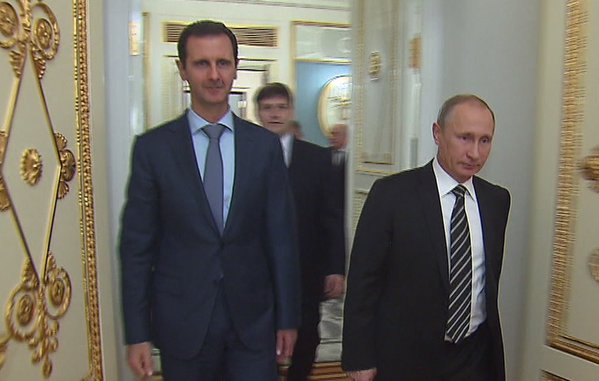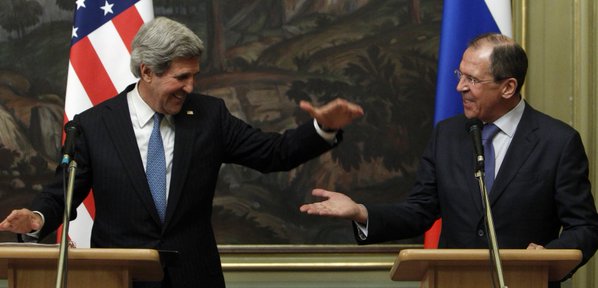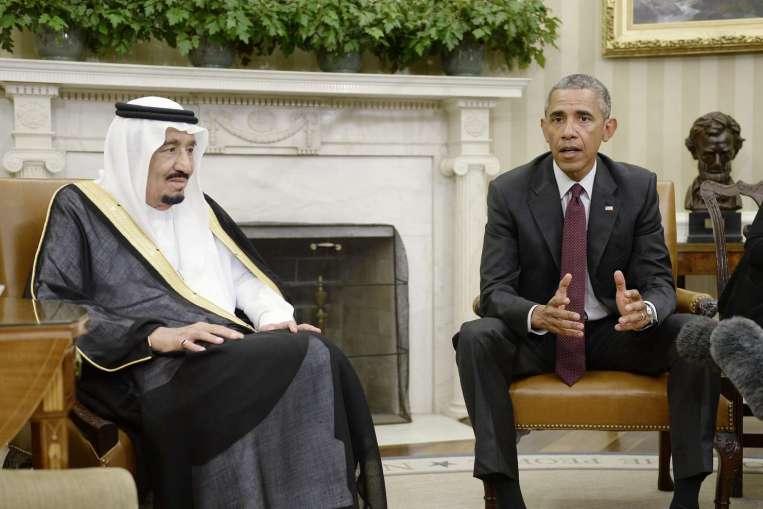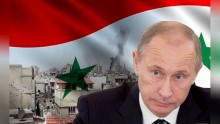Towards a reversal of the situation in the Near East
The days of the « Arab Spring » are almost over. As of now, the White House and the Kremlin are redesigning the contours of the « Greater Middle East ». However, their agreement, which was concluded before the Russian military intervention in Syria, could still be modified by the changes in the balance of power. There is no proof that Moscow will accept the stabilisation of Syria or ignore the partition of Turkey and Saudi Arabia which are soon to begin. In any event, the coming upheaval will modify the status quo which has been in place for the last five years. Most of the powers implicated are therefore scrambling to change sides before the other players.
Whatever its home country, the Press is currently too occupied with analysing the position of its own State in the Near East conflict to take any note of the ongoing global negotiations between the White House and the Kremlin [1]. As a result, it is misinterpreting certain secondary events. In order to clarify the current diplomatic agitation, we have to revisit the USA-Russian agreement of last September.
The public part of this agreement was formulated by Russia in a document distributed on the 29th September at the UN Security Council [2]. It indicates that in order to re-establish peace and stability in North Africa and the Near East, it is essential – and sufficient -
(1) to apply the resolutions of the Security Council – which notably implies the retreat of Israël to its 1967 borders – and
(2) to combat terrorist ideology – in other words, to fight the Muslim Brotherhood, created by the United Kingdom and supported by Turkey, and the Wahhabism propagated by Saudi Arabia.
It had originally been planned that Russia should call for the adoption of a resolution to this end during the Security Council meeting of the 30th September. However, the United States opposed this initiative less than one hour beforehand [3]. Sergey Lavrov therefore presided over the talks without mentioning his project. This major event can only be interpreted as a tactical disagreement which must not block a strategic agreement.

On the 20th October, at the Kremlin, President Vladimir Putin received his Syrian counterpart, Bachar el-Assad, in the presence of his Ministers for Defence and Foreign Affairs, the General Secretary of the Russian Council for National Security and the head of the secret services. The meeting concerned the application of the Russia-US plan, including the agreement of the Geneva Communiqué of 30th June 2012 [4]. President el-Assad pointed out that he was following the instructions of this Communiqué, and in particular, that he had integrated into his government the opposition parties who had requested participation, as required by the description in the Communiqué of a Transitional Governing Body.
Having verified that they both had the same understanding of the Geneva Communiqué, Russia and the United States decided to bring the dissident states into line, meaning France, Turkey and Saudi Arabia. Since they understood that the French position was not based on any realistic interests, and could only be explained by a colonial fantasy and the corruption of the French government by Turkish and Saudi money [5], the White House and the Kremlin decided to act only upon the source of the problem, in other words, Turkey and Saudi Arabia. On the 23rd October, John Kerry and Sergey Lavrov therefore received their Turkish and Saudi counterparts in Vienna. No final text was published. However, it seems that Russia threatened the two guests without the United States coming to their defence.
Frightened by the idea of a possible agreement between Russia and the United Sates against Turkey and Saudi Arabia, France convened a « working dînner » (rather than a « diplomatic summit ») in Paris. Germany, Saudi Arabia, the United Arab Emirates, the United States, Italy, Jordan, Qatar, the United Kingdom and Turkey « evoked » (rather than « decided») the fate of Syria. The format of this meeting corresponded to the meeting of the « Core Group » of the « Friends of Syria », with the exception of Egypt, who had already secretly joined with Syria. The fact of having been obliged to invite the United States polluted the atmosphere of the meeting, and once again, no final text was published.

Finally, on the 30th October, the United States and Russia gathered a wider learned assembly which included all the participants of the two previous meetings, plus Egypt, China, Iraq, Iran, Lebanon, Oman, the European Union and the United Nations. While the Press revelled in the presence of Iran, which had been refused participation in any discussion on settlement since the beginning of the conflict, it said nothing about the return of al-Sissi’s Egypt, which had originally been excluded by France, but which is now entering the international stage thanks to the discovery of its new petrol reserves. The Press also said nothing about the persistent absence of the major regional power, Israël. This last point can only be explained in the case that the Hebrew state had previously obtained a guarantee that it would be able to realise one of its war objectives, the creation of a colonial state in Northern Syria.
The participants were all required to sign a final declaration which only Russia and Iran saw fit to publish [6]. There’s a good reason for this oversight – it signals the defeat of the US hawks. Indeed, in point 8 of the text, it is stated that the « political process » - (and not the « transition phase ») will be led by the Syrians, owned by the Syrians, and that the Syrian people will decide the future of Syria. This weighty formulation invalidates Feltman’s document, which, for more than three years, had constituted the objective of several US hawks, the Frençh, the Turks and the Saudis – in other words, the total and unconditional capitulation of the Syrian Arab Republic [7].
The US project continues, despite the agreement with Russia
The next logical step should therefore be the reigning in of Turkey, Saudi Arabia and France, which should be feasible while the original US objectives are pursued.
As for Turkey, whatever the result of the general elections of the 1st November, and especially in the case of a victory for the AKP – the Justice and Development Party [8], the civil war will probably continue and spread [9] until the country is split in two, followed by the fusion of Turkish Kurdistan, Iraqi Kurdistan and a Syrian Arab territory occupied by the Syrian Kurds and the United States. Already, the YPG (People’s Protection Units) and the United States are working together to conquer an Arab territory in Northern Syria. The YPG, who, until last month, was receiving its weapons and pay from Damascus, has now turned against the Syrian Arab Republic. Its militia are invading the conquered villages, expelling teachers, and enforcing the ’Kurdisation’ of schools. Kurdish, which had previously been spoken and taught in schools, has now become the unique and obligatory language. The militia of the Syrian Arab Republic, particularly the Assyrians, are now reduced to the weaponised defence of their schools against their Kurdish compatriots [10].
As for King Salman of Saudi Arabia, he will have to swallow his defeat in Yemen – a neighbour which, officially, he had invaded in support of its absent President, but in reality, in order to exploit, with Israel, the petrol of the « Empty Quarter » [11]. One after the other, the United Arab Emirates and Egypt have left the Coalition, the former after having suffered heavy losses amongst their officers, and the latter more discretely, leaving the military operations entirely in the hands of the Israelis. The Houthis, pushed northward by the bombing, have made several incursions into Saudi Arabia where they destroyed military air bases and equipment. The Saudi soldiers, almost all of whom are foreigners fighting under the Saudi flag, have deserted en masse, obliging the King to issue a statutory order against desertion. In order to avoid a military disaster, Saudi Arabia therefore solicited the help of new allies. In exchange for money, Senegal sent 6,000 men, and Sudan 2,000. Mauritania is hesitating to send a contingent. It’s rumoured that the King has also contacted the private army Academi (ex-Blackwater/Xe) which is currently recruiting mercenaries in Columbia. This fiasco is directly imputable to Prince Mohammed ben Salmane, who lays claim to the initiative for this war. In this way, he is weakening the authority of his father, King Salman, and causing discontent among the two clans which are excluded from power, those of ex-King Abdallah and Prince Bandar. Logically, the conflict should lead to a sharing of the inheritance between the three clans, and consequently the separation of the Kingdom into three different States.

It is only after these new conflicts that peace can come to the region, except for the Arab part which is colonised by the new Kurdistan, destined to become the focal point for the expression of regional antagonism in place of Palestine.
But even if it is already written, the future remains uncertain. The reversal of the balance of power between Washington and Moscow [12] will have modified their agreement./
The rats are leaving the ship
While bad losers announce without blinking that the military intervention in Syria is not producing the results hoped for by Moscow, the fleeing jihadists are gathering in Iraq and Turkey. The US Chief of Staff, General Joseph Dunford, admitted during a Senate hearing on the 27th October that the war was evolving in favour of the Syrian Arab Republic [13]. And NATO Supreme Commander General Philip Breedlove declared during a Pentagon Press conference on the 30th October, that it is an understatement to say that the situation is evolving from day to day and is now threatening the security of Europe [14].
We are obliged to note that the alliance between the partisans of chaos and the partisans of recolonisation will not only lose in Syria, but that the Atlantic Alliance itself can no longer pretend to excercise global domination. As a result, a sudden storm of agitation is blowing through the chancelleries, many of whom are now declaring that it is time to reach a peaceful solution – which suggests that until now, they thought differently.
The primary consequences of the forthcoming « U-turns » concerning Syria will be the consecration of the international rôle of the Islamic Republic of Iran and the Federation of Russia – two actors that the Western Press were presenting, only four months ago, as being totally isolated and in danger of suffering terrible economic difficulties. These two powers are now major military forces - regional for Iran and global for Russia. The second consequence will be President el-Assad remaining in power - the man whom, for the last five years, everyone has been clamouring that « he had to go. »
In this context, war propaganda continues unchecked, with the affirmation that either the Russian or Syrian bombing is killing civilians. These charges are upheld by the central organisation of terrorist groups, the Muslim Brotherhood, by way of their Syrian Observatory for Human Rights. Or else it is claimed that Russia is anxious to negociate rapidly because its intervention is costing a lot of money – as if they had somehow overlooked budget issues during the long preparation phase. Never short of a bright idea, the Director of the CIA, John Brennan, pretends that Russia is preparing to drop President el-Assad, even though President Putin himself had mocked this attempt at auto-persuasion a few days earlier, at the Valdai International Discussion Club.
In France, the revolt is gaining the political class. The four principal right-wing leaders, Dominique de Villepin, François Fillon, Alain Juppé and Nicolas Sarkozy have each declared that it is absurd to alienate Russia and refuse to admit defeat in Syria. However, Alain Juppé, who played a central rôle at the beginning of the war, particularly






